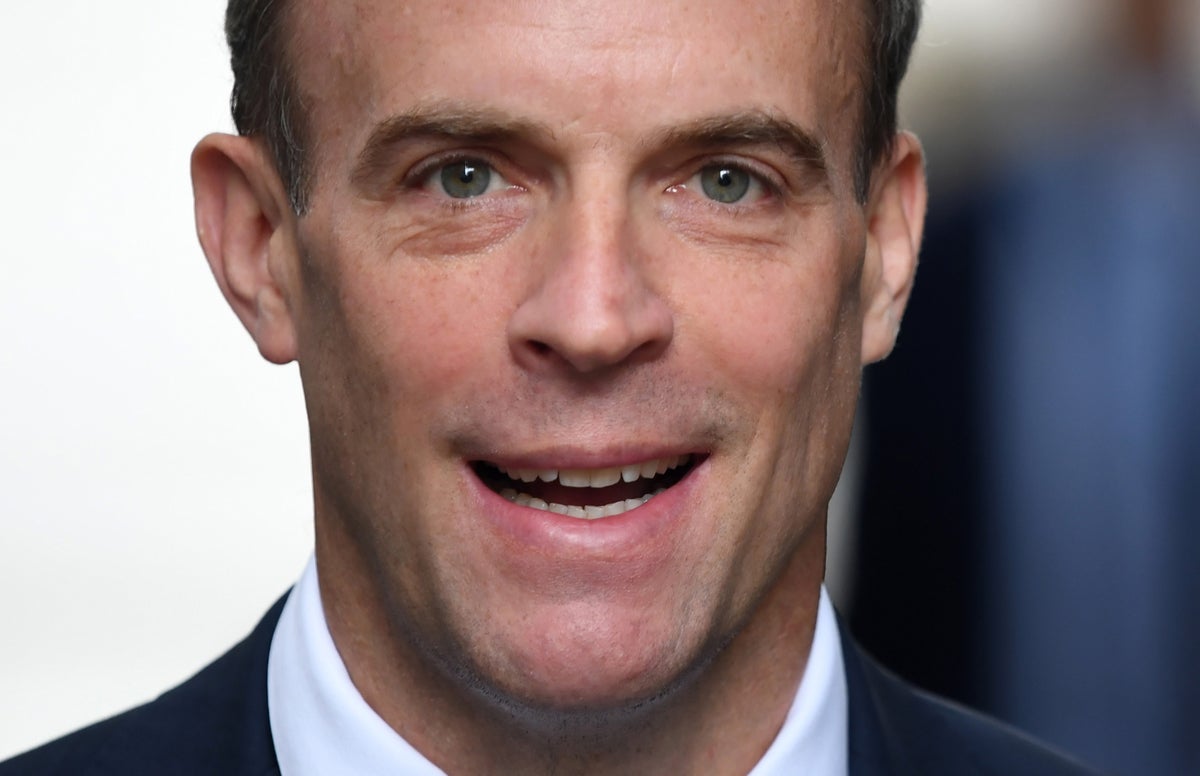
Parliament’s anti-sleaze watchdog is facing calls to open a new inquiry into Dominic Raab’s behaviour, as a campaign is launched to oust the former deputy MP from his seat in Surrey.
A new complaint has been filed with the parliamentary commissioner for standards Daniel Greenberg – arguing that Mr Raab’s conduct could amount to “serious breaches of the code of conduct”.
The letter, seen by The Independent, calls on the commissioner to examine whether Raab broke the rules which say MPs must “treat their staff and all those visiting or working for or with parliament with dignity, courtesy and respect”.
Mr Raab quit on Friday after the probe into bullying accusations found he acted in an intimidating and aggressive way – but has lashed out at “activist” civil servants and resisted calls to resign his Esher and Walton seat.
While Rishi Sunak has faced criticism from Tory MPs for using Mr Raab as “cannon fodder”, he is said to be open to the idea of bringing the loyal ally back into government after a general election or giving him a peerage.
While Mr Greenberg’s office will have to decide to open its own inquiry into Mr Raab’s behaviour, the complaint opens up the possibility of a new standards probe.
An official recall petition that would spark a by-election would have to be signed by 10 per cent of voters in his constituency if he was found to have broken the ministerial code and punished with a suspension of at least 10 days.
The complaint comes as the Liberal Democrats have launched a campaign to remove Mr Raab in the “blue wall” seat – setting up an online campaign calling for him to be sacked, and sending out fundraising emails and local campaign literature to the printers.
Party leader Ed Davey insisted that Mr Raab should quit and “face a by-election”. If he is not willing to go, the Tories should “withdraw the whip”, otherwise they are “sending a message that bullying is OK”, he told Sky News on Sunday.
A Lib Dem source added: “We are throwing the kitchen sink at this operation. People across Esher and Walton are furious with Dominic Raab and want a by-election now.”

Sir Ed also appeared to leave the door open to entering a coalition with Labour after next general election. He failed to rule out a Labour-Lib Dem coalition with Sir Keir Starmer when repeatedly challenged about the idea on Sky News’ Sophy Ridge on Sunday.
Mr Sunak was accused by Tory MPs of betrayal over the Raab scandal – with one complaining to The Sunday Telegraph that the PM “definitely doesn’t have anyone’s back. Conservative MPs are just cannon fodder”.
Independent lawyer Adam Tolley KC concluded that Mr Raab engaged in an “abuse or misuse of power” that “undermines or humiliates” while foreign secretary.
Mr Sunak’s senior advisers discussed how to save Mr Raab’s job because they feared complaints against other cabinet ministers, according to The Sunday Times.
But Mr Raab’s own pledge to resign if claims were upheld are thought to have made it impossible. The PM could give Mr Raab a peerage if he does not bring him back into government in future, according to the newspaper.

The new deputy PM Oliver Dowden refused to say if Mr Raab was a bully, but said he was “right” to have resigned because of “adverse” findings. Mr Dowden also said on Sunday that Mr Sunak still has “great affection” for Mr Raab.
Mr Dowden also suggested on Sunday’s Laura Kuenssberg programme that the former Labour PM Gordon Brown would have been deemed to have bullied staff in “today’s climate”.
Pressed on whether the definition of bullying had changed over the years, Mr Dowden said: “It was no great secret what happened with Gordon Brown when he was prime minister – I don’t think that kind of conduct from him would be acceptable in today’s climate.”
Responding, Labour frontbencher Jonathan Ashworth told GB News: “I worked very closely with Gordon Brown, and Gordon is a robust personality – but he’s not a bully.”
Meanwhile, a Tory peer who is leading a government review into how the civil service operates has called for more “politicisation” of Whitehall by allowing ministers more power to appoint their own officials.
Lord Francis Maude said the system needs to be less “mealy-mouthed about politicisation” in the wake of the Raab resignation, saying permanent civil servants in France often have over political affiliations without problems.
Writing in The Observer, Lord Maude said that there will be more cases like Mr Raab’s in which “frustrations boil over” and suggested ministers could be given more say in the appointments of civil servants.







